Georgian far-right and pro-government actors collaborate in inauthentic Facebook network
Individuals linked to ultra-nationalist political party
Georgian far-right and pro-government actors collaborate in inauthentic Facebook network

Individuals linked to ultra-nationalist political party Georgian March and pro-government fringe media outlet PosTV used a single inauthentic network to promote their content

The DFRLab has identified an inauthentic network promoting ultra-nationalist political party Georgian March and pro-governmental media outlet PosTV on Facebook. The network camouflaged itself as entertainment and online shopping platforms and included up to 30 Facebook groups, 30 pages, and 10 personal accounts.
Ultra-nationalist and far-right group Georgian March was established in 2017 in Georgia and transformed into a political party in summer of 2020 to participate in the recent parliamentary elections. In 2017, Georgian March organized a rally demanding the expulsion of “illegal migrants” from the country. Since then, the group has repeatedly targeted the LGBT community, democracy activists, and immigrants.
Although the group has denied its suspected links to the Kremlin, an Estonian Intelligence Service report referred to Georgian March as a Russian-backed “umbrella organization for extremist movements” promoting “so-called traditional values.” Georgian March has strong ties with local pro-Kremlin actors, including the Y. M. Primakov Georgian-Russian Centre and Levan Vasadze, a millionaire and supporter of local conservative and far-right groups. Vasadze has strong ties with Alexander Dugin, a geopolitical theorist known for his fascist views and close ties to the Kremlin (some call him “Putin’s brain”). The DFRLab’s investigation also revealed Georgian March’s links to an author at News Front, a Kremlin-backed disinformation website amplifying Moscow’s political agenda. The DFRLab previously covered the activities of News Front in reporting of a prior Facebook takedown.
Civil society representatives and political experts have long raised concerns about the affiliation of Georgian March with the ruling Georgian Dream party. Until 2016, the leader of Georgian March, Sandro Bregadze, was the government’s Deputy Minister of Diaspora Affairs. Ifact, a group of Georgian investigative journalists, reported that Bregadze’s relatives donated to Georgian Dream in the pre-election period in 2016. Some commentators have said that Georgian Dream downplays the danger posed by Georgian March and similar far-right groups and wields the party as tool for intimidating liberal groups and pro-democracy activists that are also critical of the government. In that regard, Georgian March appears to be serving its purpose: a May 2018 White Noise demonstration was, in fact, disrupted by a Georgian March counter-rally, as was an IDAHOT demonstration on May 17, 2018.
Pro-government outlet running disinformation campaigns
PosTV is a government-affiliated television outlet that started broadcasting in 2018. PosTV’s former co-owner and executive director, Lasha Natvslishvili, now serves as public relations advisor for Georgian Dream. Another well-known PosTV personality, owner and anchor Shalva Ramishvili, has previously attacked critical media outlets, pro-democracy activists, civil society, and the opposition parties. In 2005, Ramishvili was arrested and found guilty of blackmail and extortion of $100,000 USD from a then-ruling party lawmaker. In 2018, he was found guilty of abusing power and sexually harassing his employee Tatia Samkharadze. Despite this, chairman of the Georgian Dream ruling party, oligarch Bidzina Ivanishvili, has personally praised Ramishvili.
PosTV has also been involved in organizing disinformation campaigns on Facebook attempting to discredit protests that erupted in June 2019 after the visit of Russian MP Sergey Gavrilov to Georgia. In November 2019, the outlet spread disinformation claiming that demonstrators refused to open the road they were blocking for an emergency vehicle, resulting in the death of the patient. The disinformation narrative was immediately picked up by pro-government pages and fringe media outlets and was soon refuted by local fact-checking websites.
Facebook pages
The DFRLab identified 29 pages involved in the inauthentic network. The posts on the pages received little engagement, and the total audience for these pages, based on number of page likes, was more than 98,000. These assets, together with the identified groups below, were connected to George Toreli, a photographer and video blogger.
The pages presented themselves as focused on general interest topics, such as online sales and marketing, travel, photography, movies, or entertainment. In reality, however, they promoted Georgian March and PosTV content on their Facebook timelines and to related groups in a coordinated manner.
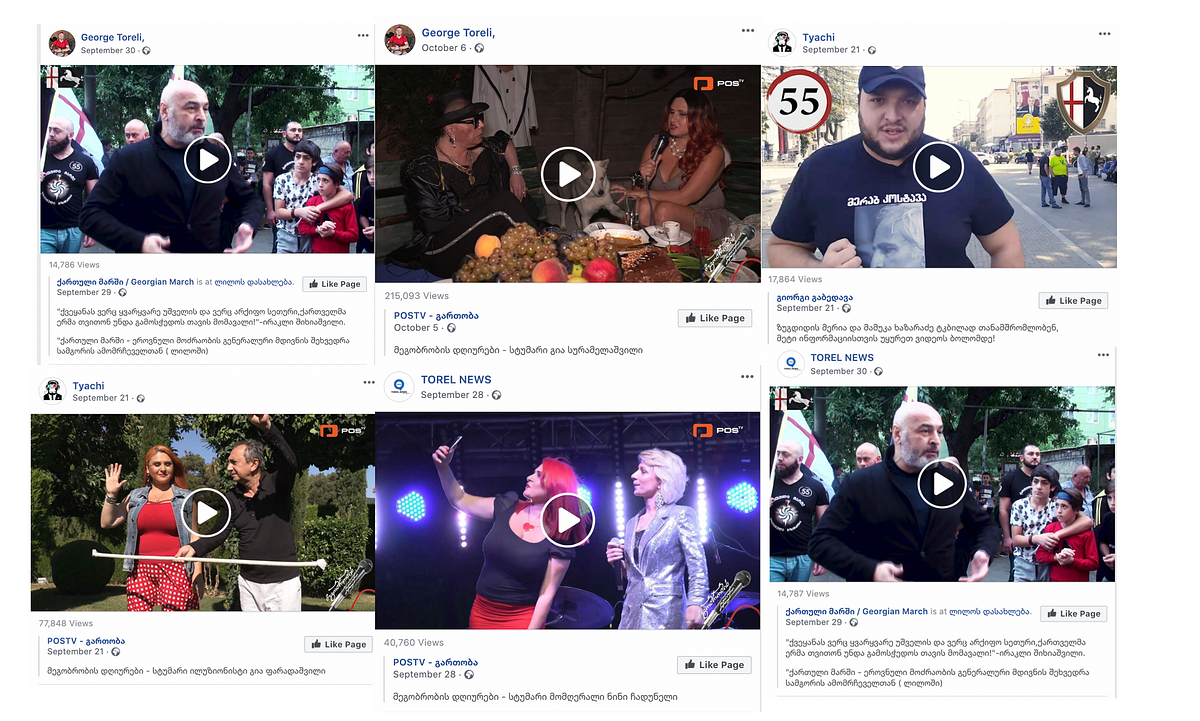
Pages in the network reshared the same posts from PosTV and Georgian March within the same minute on a systematic basis, a pattern that indicated a strong degree of technical coordination or that the pages were centrally managed.
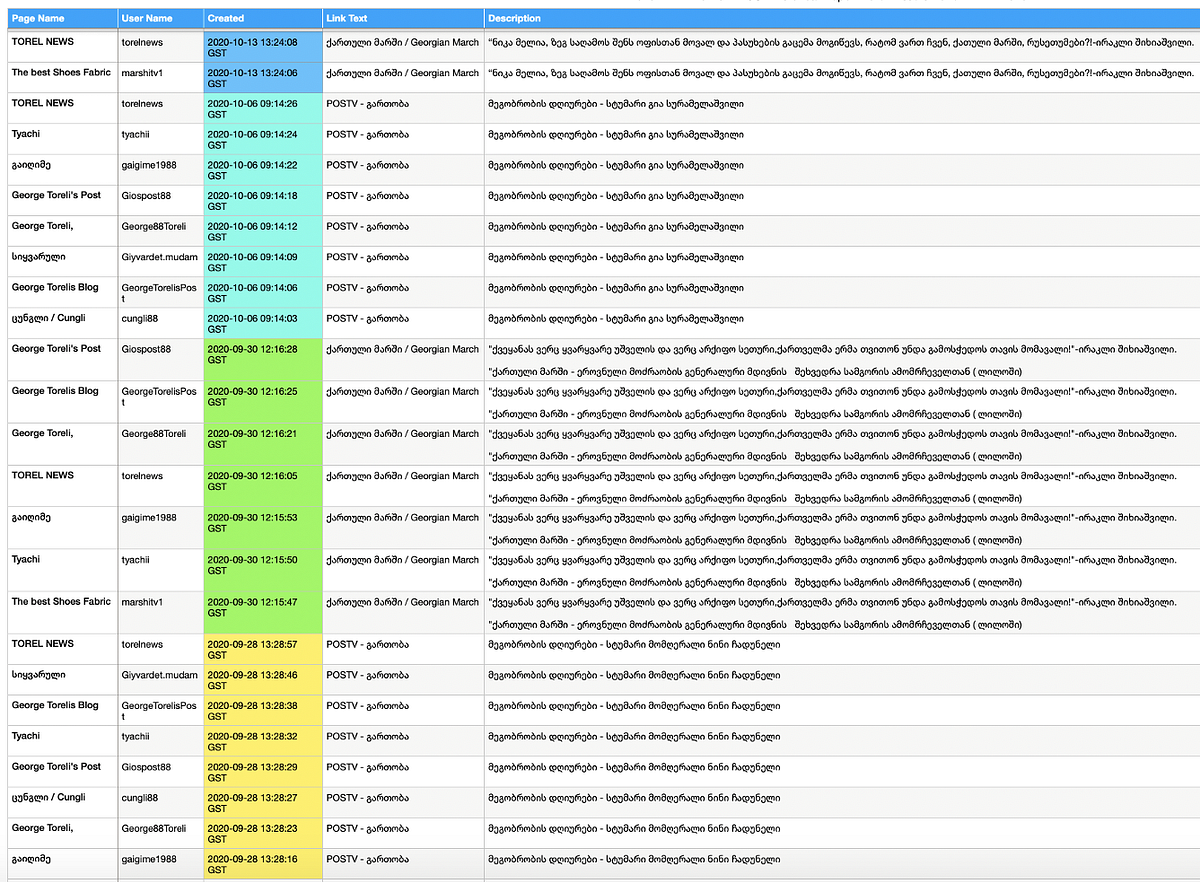
მარში ტვ (“March TV”), one of the pages in the network, was created on September 1, 2020, ahead of the Georgian parliamentary elections. The page is affiliated with Georgian March and, in a recent post, announced that it would soon start broadcasting. The page shared content from Georgian March’s official page and also administered two public groups, საგიჟეთი, ღამურები, შერეკილები (“Madhouse, Bats, Eccentrics”) and ყიდვა გაყიდვა საქართველოში (“Buy and Sell in Georgia”).
The announcement about March TV’s upcoming broadcast was actively shared in multiple other groups outside of the network by Beka Kvitsiani, an author with Kremlin-affiliated disinformation outlet News Front Georgia, as identified by Georgian fact-checking organization Myth Detector. Kvitsiani openly expressed his support for Georgian March in the parliamentary elections.
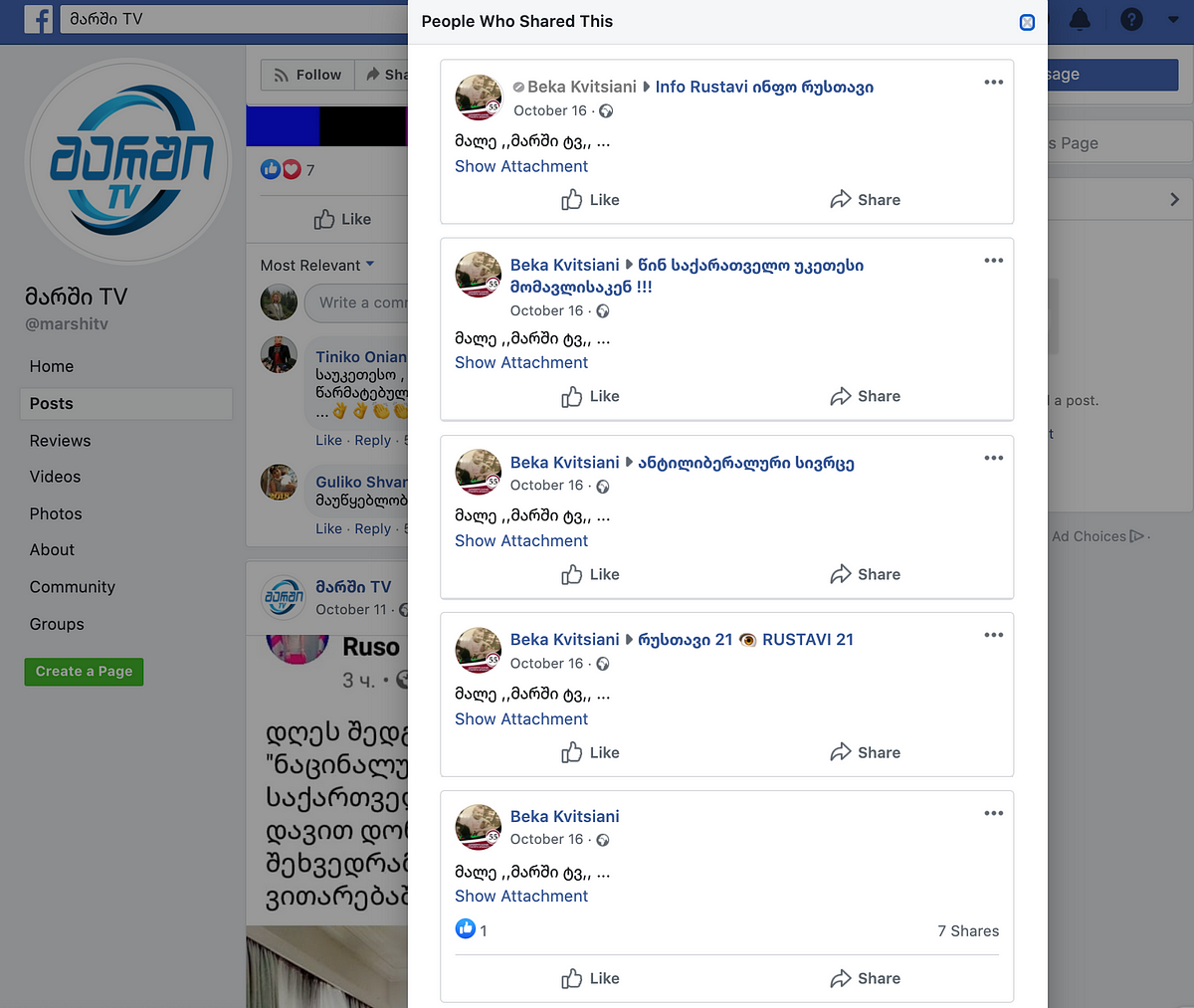
“The best Shoes Fabric,” another page in the network, posed as a page for buying and selling sneakers but failed to hide some of its connections to the network. Despite promoting shoes for sale, the page was listed under the “Internet Television” category, and its page ID was marshitv1 (similar to March TV’s page ID, marshitv). The page also linked to the official website of Georgian March in its “About” section. In addition, the email listed as contact for the page belonged to George Toreli, who appeared as a contact on other pages in the network. “The best Shoes Fabric” page was also a co-administrator of other groups promoting Georgian March and PosTV.
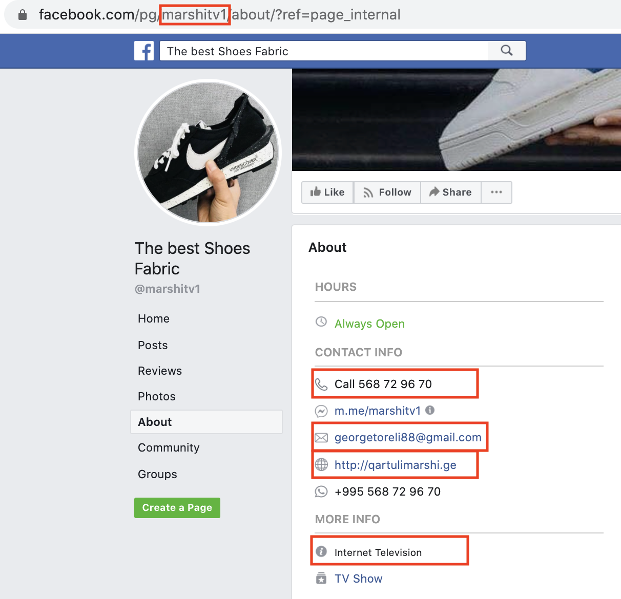

Facebook accounts
The network also involved several personal accounts that promoted content from Georgian March and PosTV. Some of the accounts exhibited indicators of inauthenticity, including profile photos stolen from elsewhere on the internet. Two of these accounts indicated that they work as PR managers at Georgian March.
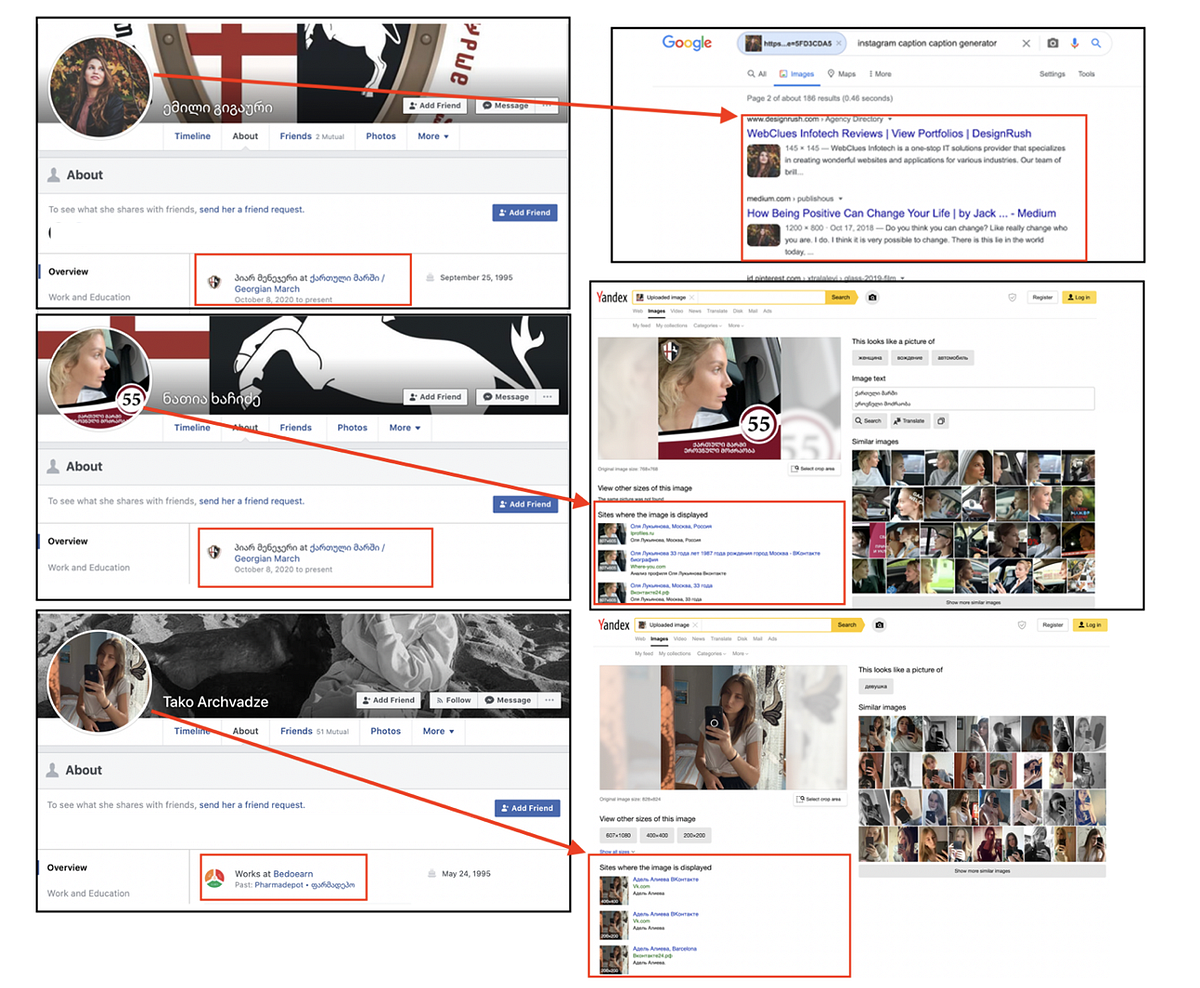

Facebook groups
The 30 Facebook groups in the network, some of which were private, had a combined membership of around 40,000. Engagement with their posts was low and, in many cases, close to zero.
Similar to the pages, the groups used deceptive names that indicated they were focused on apolitical topics while hosting political content related to Georgian March and PosTV for an unsuspecting audience.
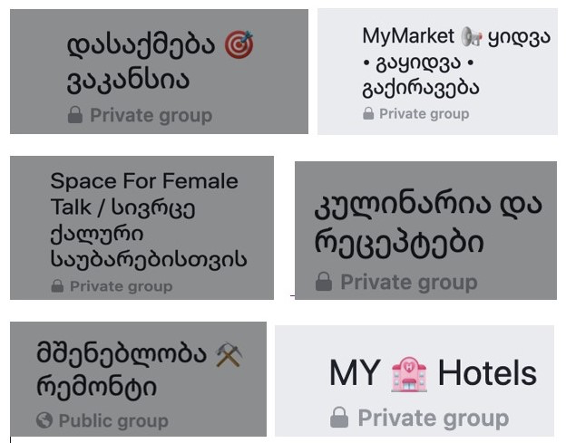
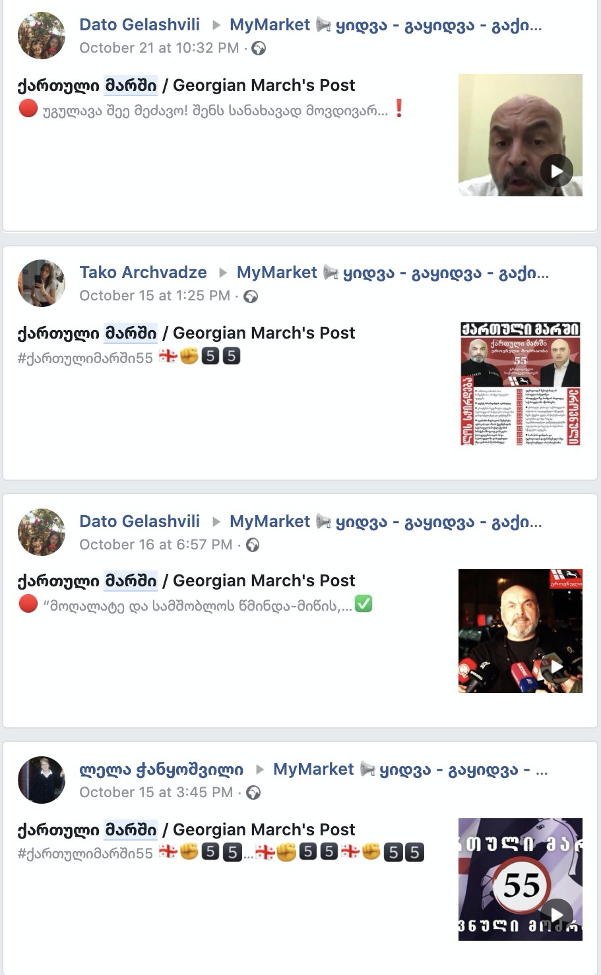
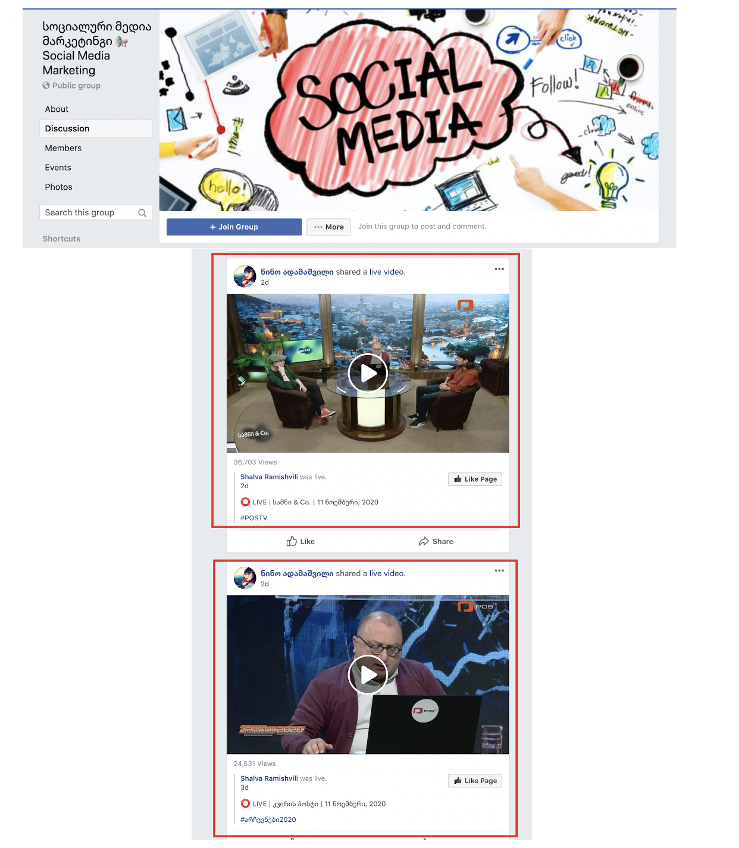
Many of the groups were managed by common administrators, some of which were pages and personal accounts discussed above.
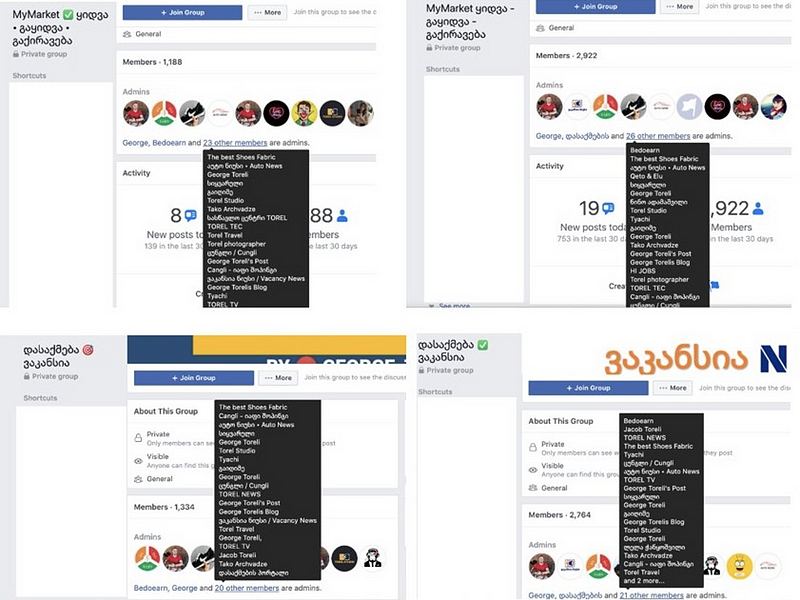
“The best Shoes Fabric” page, for example, was a common group administrator in the network, as was the March TV page, which was a co-admin of two public groups: საგიჟეთი 😋 ღამურები 😝 შერეკილები 🥴 (“Madhouse, Bats, Eccentrics”) and ყიდვა გაყიდვა საქართველოში (“Buy and Sell in Georgia”).
Another administrator of multiple groups in the network was the account for ნინო ადამაშვილი (Nino Adamashvili) a host of an entertainment show at PosTV. Adamashvili’s account was a co-admin for at least three groups, alongside “The best Shoes Fabric” and “March TV:” საგიჟეთი 😋 ღამურები 😝 შერეკილები 🥴 (“Madhouse, Bats, Eccentrics”), MyMarket 🛒 ყიდვა • გაყიდვა (“MyMarket Buy • Sell”), and სოციალური მედია მარკეტინგი 📢 Social Media Marketing. In addition to managing these groups, Adamashvili also promoted PosTV political content in them.
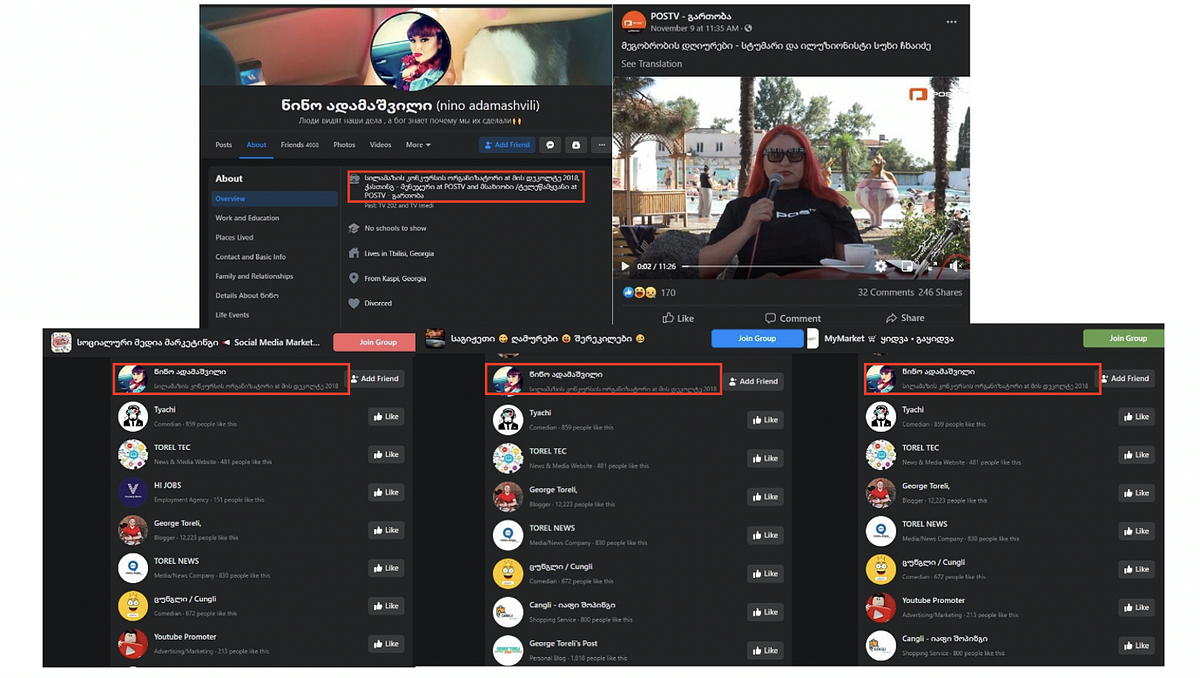
Adamashvili also managed at least two other groups — საქართველო — GEORGIA and ქართული სიმღერები (“Georgian songs”) — that engaged in deceptive behavior. The first group was initially created under the name “Stop COVID-19 Georgia” in March 2020 and renamed to its current name, საქართველო — GEORGIA “Georgia — GEORGIA,” on October 30, a day before the parliamentary elections. The second group, which, according to its name, should be dedicated to Georgian music, was in fact used to promote PosTV’s political content along with other topics.
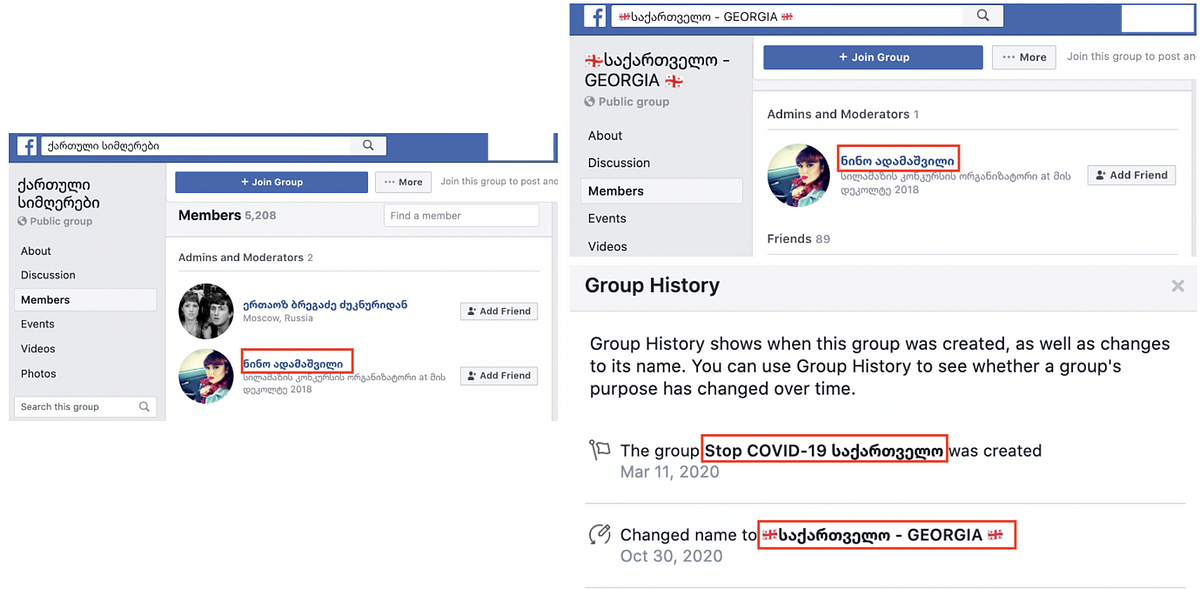
Some of the Facebook groups in the network appeared to be duplicates or variations of one another, using similar naming conventions that usually referenced online sales or job vacancies.
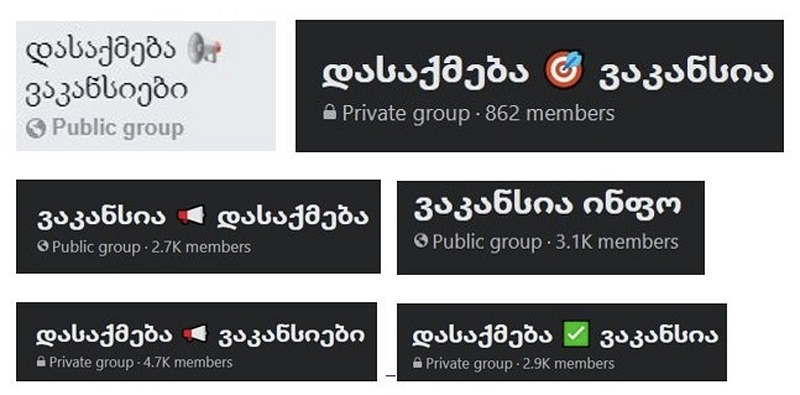
Overall, this network exhibited several indicators of both coordination and inauthenticity among user accounts, pages, and groups. The general strategy seemed to be to lure an unsuspecting audience in with group names that appeared apolitical, then expose that audience to political content promoting both PosTV and Georgian March.
Sopo Gelava is a Research Associate, Caucasus, with the Digital Forensic Research Lab.
Eto Buziashvili is a Research Associate, Caucasus, with the Digital Forensic Research Lab.
This report/article is based on the insights uncovered through the Georgia Information Integrity Program (GIIP).
This report/article is made possible by the generous support of the U.S. people through the United States Agency for International Development (USAID) within the framework of the GIIP. The content of this report/article is the responsibility of Atlantic Council’s Digital Forensic Research Lab and may not necessarily reflect the views of USAID or the United States Government.
This report was translated into Georgian by On.ge as a part of the #ElectionWatch Georgia project, which is made possible through support from East-West Management Institute (EWMI) and USAID.
Follow along for more in-depth analysis from our #DigitalSherlocks.

